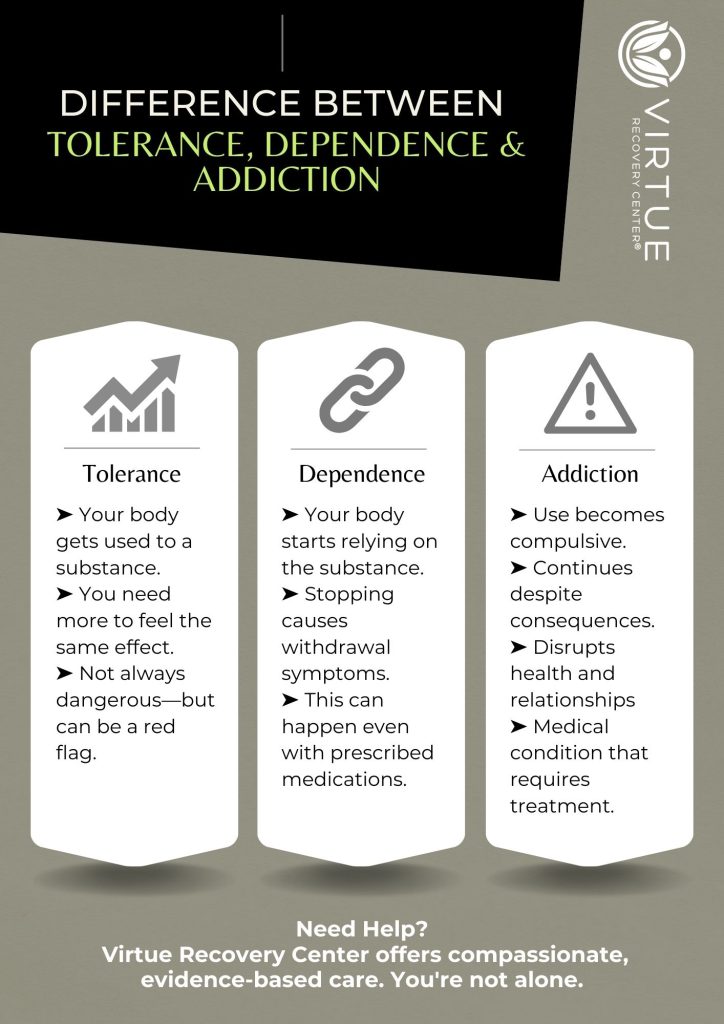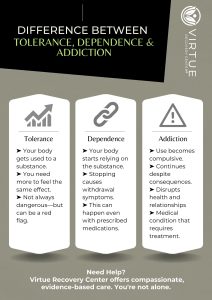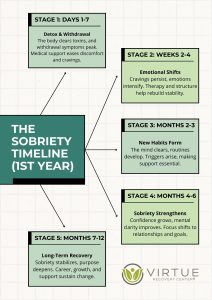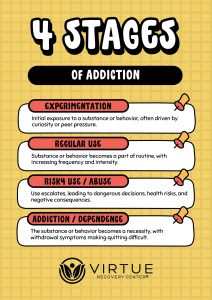Key Takeaways
- Tolerance, dependence, and addiction are related but distinct stages of substance use.
- Understanding how they develop helps identify early warning signs and when to seek help.
- Virtue Recovery Las Vegas offers compassionate, expert treatment. Call 866-520-2861 to speak with a specialist.
Introduction
It’s common to hear the words tolerance, dependence, and addiction used when talking about drugs or alcohol. Many people think they mean the same thing—but they don’t. Knowing how they differ can help you understand what’s happening to yourself or someone you care about.
You might wonder if building a tolerance to medication is a sign of addiction, or if someone can be physically dependent on a drug without having a problem. The answer isn’t always simple, but learning the difference is a powerful step toward making safer choices and knowing when to reach out for help.
What Is Tolerance?
Tolerance is often the first stage in the body’s response to repeated drug or alcohol use. It happens when the same amount of a substance no longer produces the same effect. As the body adjusts, a person may need more to feel the same level of pain relief, relaxation, or euphoria they once did.
For example, someone might start with a single drink or a low dose of a prescribed pain medication, but over time, that dose doesn’t feel like enough. This doesn’t mean they’re addicted, but it could be a sign they’re moving toward riskier use. Tolerance can be part of a medical treatment plan, such as long-term pain management, but it’s also a red flag when it leads to increasing doses without medical guidance.
What Is Alcohol & Drug Dependence?
Dependence takes things a step further. When someone is dependent on a substance, their body has come to rely on it to function normally. If they try to stop, withdrawal symptoms can set in—ranging from sweating and shaking to anxiety, nausea, or difficulty sleeping.
This can happen even when someone is using a medication exactly as prescribed. For example, a person taking opioids for post-surgical pain may find that after a few weeks, they feel sick or uncomfortable if they miss a dose. That doesn’t mean they’re addicted, but it does mean their body has developed a physical need for the substance.
Dependence doesn’t always involve harmful behavior, but it can make quitting or cutting back feel very difficult. Without support, people may continue using just to avoid feeling sick, which can increase the risk of developing a deeper issue.
What Is Addiction?
Addiction is more than just a physical need—it’s a medical condition that changes the way the brain works. A person who is addicted can’t stop using a drug or alcohol, even if it’s clearly causing harm. This includes problems at work, in relationships, or with their health.
Unlike dependence, addiction involves cravings, loss of control, and continued use despite negative consequences. Someone with addiction might try to stop multiple times but always return to using. They might lie about their use, lose interest in activities they once enjoyed, or feel like they can’t get through the day without the drug.
It’s important to understand that addiction isn’t a choice or a weakness. It’s a condition that often requires treatment—just like any other chronic illness.
How These Conditions Are Connected
Though they’re different, tolerance, dependence, and addiction are connected. Often, they develop in that order, especially with long-term or repeated use. Someone may build a tolerance first, then become dependent, and eventually develop an addiction.
But that progression doesn’t happen to everyone. Some people become addicted without ever showing strong signs of tolerance. Others may become dependent but never experience the compulsive behavior that defines addiction.
The key is to recognize the warning signs early. A person increasing their dose, struggling to stop, or feeling like they need the drug to get through the day may already be on a path toward addiction—even if they haven’t hit what people typically think of as “rock bottom.”
The Role of Withdrawal Symptoms From Substance Abuse
One of the most challenging parts of dependence is withdrawal. When someone’s body is used to having a drug in their system, stopping can be uncomfortable—or even dangerous.
Symptoms of withdrawal vary depending on the substance and how long it’s been used. Some people feel flu-like symptoms, others experience intense anxiety, trouble sleeping, mood swings, or cravings. In severe cases, like alcohol or benzodiazepine withdrawal, medical complications can arise, making it unsafe to quit cold turkey without supervision.
This is one reason why people often continue using—just to avoid feeling sick. It’s also why professional detox and medical care can be critical in early recovery.
When Tolerance or Dependence Becomes a Problem
Tolerance and dependence aren’t always a problem on their own, especially when they’re monitored by a doctor. But they can become dangerous if they lead to misuse.
Someone might start taking more than prescribed. Or they might begin using the drug for emotional reasons, like managing stress or escaping sadness. This kind of behavior raises the risk of addiction, overdose, or serious health complications.
If drug or alcohol use starts to interfere with daily life—whether that’s through relationship issues, poor work performance, or risky behavior—it’s time to take a closer look. These patterns often signal that a person needs help, even if they haven’t reached the level of full-blown addiction.
Infographic: Understanding the Difference

Here’s a quick visual reference to help clarify what sets these three stages apart:
- Tolerance develops when your body gets used to a substance, and more is needed to feel the same effect. It’s not always harmful, but it can be a warning sign.
- Dependence occurs when your body starts to rely on the drug, and stopping leads to withdrawal. This can happen even with prescription drugs.
- Addiction is when use becomes compulsive, continues despite harm, and disrupts daily life. It’s a medical condition that requires treatment.
If you’re concerned about where you or someone else may fall on this spectrum, know you’re not alone. Virtue Recovery Center is here to help.
Conclusion: You’re Not Alone—Help Is Available
It’s easy to get confused about the difference between tolerance, dependence, and addiction. But understanding these terms can be the key to recognizing when help is needed—and preventing things from getting worse.
Whether you’re just starting to notice changes in how you use a substance, or you’ve been struggling for a long time, support is available. At Virtue Recovery Las Vegas, we offer expert care tailored to where you are in your journey. Our compassionate team provides medically supervised detox, therapy, and long-term support to help you or your loved one find a healthier path forward.
Call 866-520-2861 today to speak with a recovery specialist. The sooner you reach out, the sooner healing can begin.
FAQs About Alcohol & Drug Tolerance vs Dependence and Addiction
What’s the difference between tolerance and dependence?
Tolerance means the drug doesn’t work as well as it used to, and more is needed for the same effect. Dependence means the body needs the drug to function normally and will react if it’s taken away.
Can someone be dependent on a drug without being addicted?
Yes. A person can rely on a drug physically without misusing it or feeling out of control. But dependence still requires careful management, especially when stopping the drug.
Does addiction always include physical withdrawal?
Not always. Addiction is defined more by behavior—such as compulsive use and loss of control—than by withdrawal symptoms alone.
Is building a tolerance a sign of addiction?
Not necessarily. Tolerance can occur without addiction, but it increases the risk. If someone begins increasing doses or chasing a high, it may be time to get help.
Where can I get treatment for addiction or substance misuse?
Call 866-520-2861 to speak with Virtue Recovery Las Vegas. We’ll guide you through treatment options and help you take the first step toward recovery.
Resources
https://www.webmd.com/mental-health/addiction/tolerance-dependence-addiction-explained
https://pubmed.ncbi.nlm.nih.gov/3325655/
https://www.nhs.uk/live-well/addiction-support/addiction-what-is-it/












